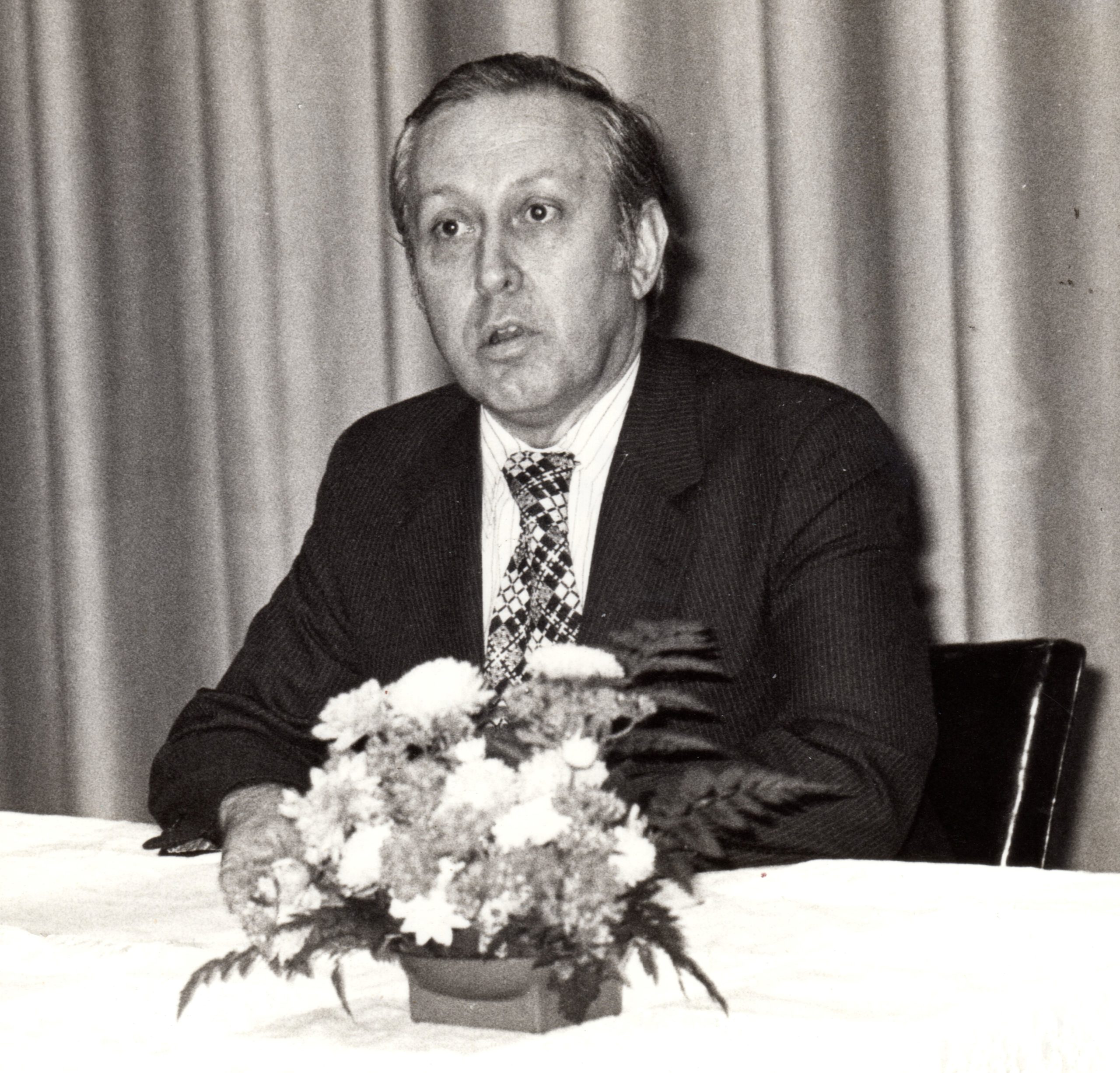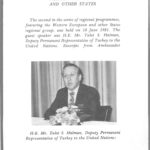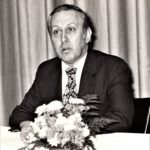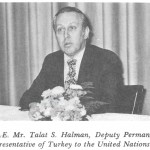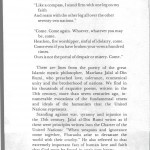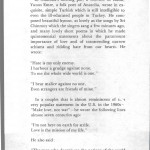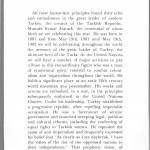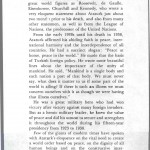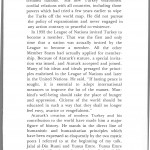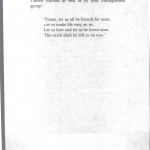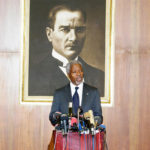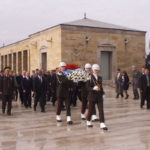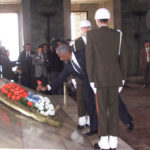Turkey Speaker at Western European and Other States Event 10 Jul 1981
Filed under europe | Thoughts from the UN community.The second in the series of regional programmes (featuring the Western European and other States regional group) was held on 10 Jul 1981*. The guest speaker was H.E. Mr. Talat S. Halman, Deputy Permanent Representative of Turkey to the United Nations.
*Note some print reports note 10 Jun for this event, However the first in this regional series was 07 July and photo from this second in the regional series event says 10 Jul, it is most likely that 10 Jul is correct date.
Excerpts from Ambassador H .E. MrTalat S. Halman, Deputy Permanent Representative of Turkey to the United Nations:
“The nation of love differs from all others. Lovers bear allegiance to no nation or sect. ”
“Whatever you think of war, I’m far, far from it. Whatever you think of love, I am that, only that, all that. “
“Like a compass, I stand firm with one leg on my faith And roam with the other leg all over the other seventy-two nations.”
“Come. Come again. Whoever, whatever you may be, come. Heathen, fire worshipper, sinful of idolatry, come. Come even if you have broken your vows a hundred times. Ours is not the portal of despair or misery. Come.”
These are lines from the poetry of the great Islamic mystic philosopher, Mawlana Jalal aI-Din Rumi, who preached love, tolerance, ecumenical unity and the brotherhood of nations.
We find in his thousands of exquisite poems, written in the 13th century, more than seven centuries ago, in-numerable evocations of the fundamental tenets and ideals of the humanism that the United Nations represents.
Standing against war, tyranny and injustice in the 13th century, Jalal aI-Din Rumi writes as if these were principles written into the Charter of the United Nations:
“When weapons and ignorance come together, Pharaohs arise to devastate the world with their cruelty.”
He also referred to that extremely important fact of human love and faith that God must be found in one’s own heart: 12
“1 roamed the lands of Christendom from, end to end, Searching all over, but He was not on the cross. 1 went into the temples where the Indians worship idols And the Magicians chant prayers of fire: I found no trace of Him. Riding at full speed, 1 looked all over the Moslem Kaba, But He was not at that sanctuary for young and old. Then 1 gazed right into my own heart. There 1 saw Him. He was there and nowhere else.”
Rumi’s vision of the unity of mankind and love in “he reality and beauty of God prompted admiration hJm Gandhi, who used to quote Rumi’s couplet: “To unite, that is why we came; To divide, that is not our aim,” and from Pope John XXIII, who wrote in 1958, “In the name of the Catholic world, I bow with respect before the memory of Rumi.”
Like most Islamic mystics before and after him, Rumi expressed his faith in the human spirit, transcending schisms and sectarianism. It was his humanitarian ideal that attracted to his funeral not only the dervishes, his own followers, and other Moslem’s, but also Christians, Jews, Greeks and Armenians of Anatolia who came to pay tribute as well.
That was in the city of Konya where he spent about 45 years of his life and where he is buried. Konya was known as a melting pot. (That reminds me of a story of my son, who at age six was asked to write his first composition at the United Nations 1 international School. The topic was New York City. He had heard that New York City was a great melting pot. He wanted to vary that sentence a little bit, and he wrote: “New York is a pot that is melting.”.
In Anatolia’s melting pot, a follower of Rumi, Yunus Emre, a folk poet of Anatolia, wrote in exquisite, simple Turkish which is still intelligible to even the ill-educated people in Turkey. He composed beautiful hymns, as lovely as the songs by Sri Chinmoy which the singers sang a few minutes ago, and many lovely short poems in which he made quintessential statements about the paramount importance of love and of transcending narrow schisms and ridding hate from our hearts. He wrote: “Hate is my only enemy. I harbour a grudge against none. To me the whole wide world is one.”
“I bear malice against no one, Even strangers are friends of mine.” In a couplet that is almost reminiscent of that very popular statement in the U.S. in the 1960s-“Make love, not war” -he wrote the following lines almost seven centuries ago: ”I’m not here on earth for strife. Love is the mission of my life.” He also said: “The man who doesn’t see the nations of the world as one is a heretic, even if the pious claim he is holy.” 14
“The lover must love all the 72 nations.” “The man who feels the marvels of true love abandons his religion and nation.” All these humanistic principles found their echo and embodiment in the great leader of modern Turkey, the creator of the Turkish Republic, Mustafa Kemal Ataturk, the centennial of whose birth we are celebrating this year.
He was born in 1881 and from May 19th, 1981 until May 19th, 1982 we will be celebrating throughout the world the memory of the great leader of Turkey, the ultimate hero of the Turks.
At the United Nations we will have a number of major activities to pay tribute to this extraordinary figure who was a man of ecumenical spirit, resolved to combat colonialism and imperialism throughout the world. He holds a significant place as an early 20th century world statesman and peacemaker. His works and actions are embodied, in a way, in the principles subsequently enshrined in the United Nations Charter. Under his leadership, Turkey established a progressive republic, after repelling imperialist occupation.
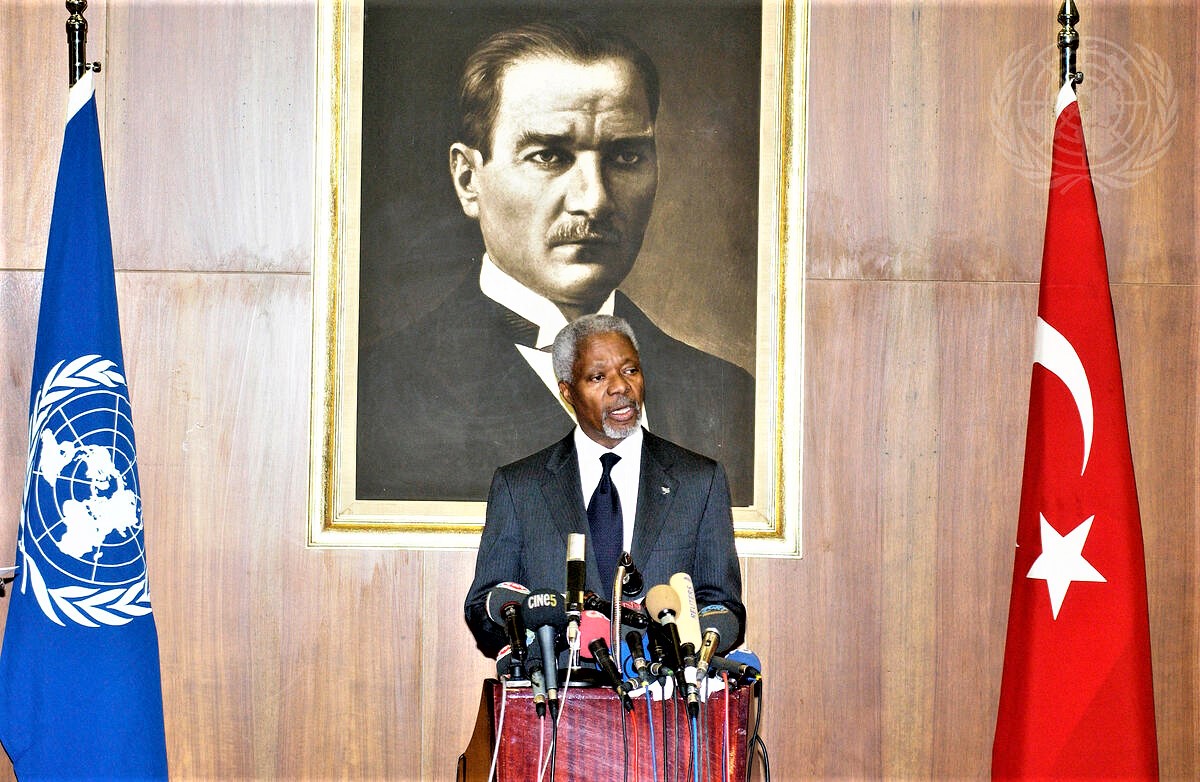
2003-02-23f3b-UN-S-G-Annan-Speaking-Portarait-behind-founder-1st-Pres-modern-Republic-Turkey-Ataturk-un-Photo-UN7313616-Eskinder-Debebe-2.jpg
He was a forerunner of secular government and launched sweeping legal, political and cultural reforms, including the conferring of equal rights to Turkish women. He espoused the cause of anti-imperialism and eloquently expressed his belief that “As clearly as I see daybreak, I have the vision of the rise of the oppressed nations to their independence.” That prophetic vision, of course, came true. And therefore many prominent leaders among the emerging nations throughout the world, including Nehru, Nasser, Bourguih..and others, stated they saw Ataturk as their model of national emancipation and sovereignty based on democratic principles. Tributes to his memory also came from such great world figures as Roosevelt, de Gaulle, Eisenhower, Churchill and Kennedy, who wrote a very eloquent statement about Ataturk just about two month prior to his death, and also from many other statesmen, as well as from the League of Nations, the predecessor of the United Nations. From the early 1920s until his death in 1938, Ataturk affirmed his abiding faith in peace, inter-national harmony and the interdependence of all countries. He had a succinct slogan: “Peace at home, peace in the world.” He made that the basis of Turkish foreign policy. He wrote some beautiful lines about the importance of the unity of mankind.
He said, “Mankind is a single body and each nation a part of that body. We must never say, what does it matter to us if some part of the world is ailing? If there is such an illness we must concern ourselves with it as though we were having that illness ourselves.” He was a great military hero who had won victory after victory against many foreign invaders. But as a heroic military leader, he knew the value of peace and did his utmost to secure and strengthen it throughout the world during his fifteen-year presidency from 1923 to 1938.
Few of the giants of modern times have spoken with Ataturk’s eloquence on the vital need to create a world order based on peace, on the dignity of all human beings and on the constructive inter-dependence of all nations. He stated immediately after the Turkish War of Independence that 16
“Peace is the most effective way for nations to obtain prosperity and happiness.” Later, ~s he concluded treaties of friendship and created regional ententes, he affirmed: “Turks are the friends of all civilised nations.” His new Turkey established cordial relations with all countries, including those powers which had tried a few years earlier to wipe the Turks off the world map.
He did not pursue the policy of expansionism and never engaged in any action contrary to peaceful co-existence. In 1932 the League of Nations invited Turkey to become a member. That was the first and only time that a nation was actually invited by the League to become a member.
All the other Member States had actually applied for member-ship. Because of Ataturk’s stature, a special invitation was issued, and Ataturk accepted and joined. Many of his ideas and ideals presaged the principles enshrined in the League of Nations and later in the United Nations. He said, “If lasting peace is sought, it is essential to adopt international measures to improve the lot of the masses. Man-kind’s well-being should take the place of hunger and oppression. Citizens of the world should be educated in such a way that they shall no longer feel envy, avarice or vengefulness.”
Ataturk’s creation of modern Turkey and his contribution to the world have made him a major figure of history. He stands in the direct line of humanistic and humanitarian principles which have been expressed so eloquently by the two mystic poets I referred to at the beginning of my talk, Jalal aI-Din Rumi and Yunus Emre.
Yunus Emre once said, “For those who truly love God and His Ways, all the people of the world are brothers.” He also issued, seven centuries ago, a plea to people of all faiths, of all nations – a plea which is just as valid and vitally important in our time. It is a call for peace that might have been voiced by the United Nations as well as by your distinguished group: “Come, let us all be friends for once. Let us make life easy on us. Let us love and let us be loved ones. The earth shall be left to no one.”
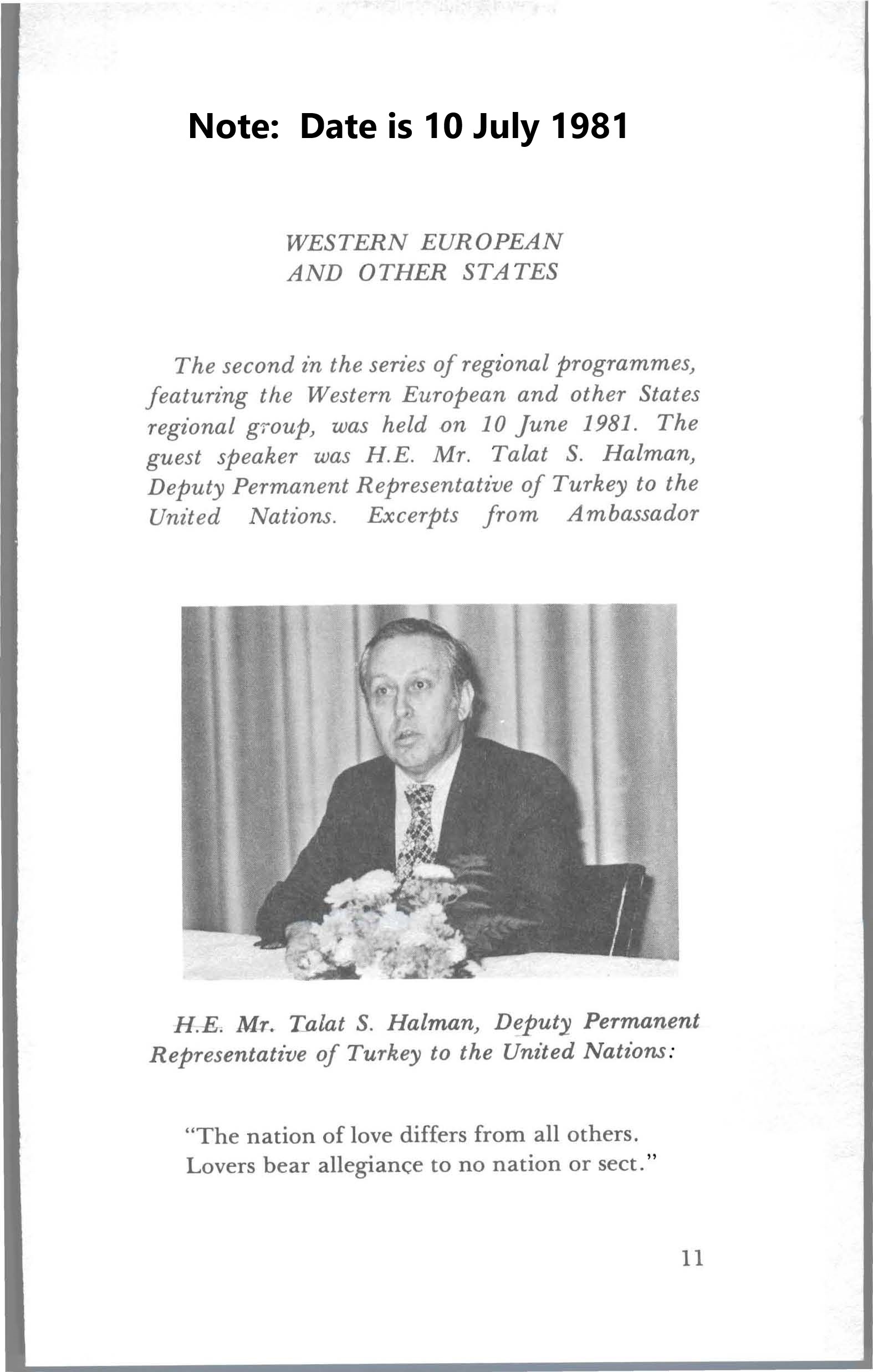
bu-scpmaun-1981-07-08-27-vol-09-n-07-08-jul-aug_Page_13-says-10-june-should-be-10-july-top-og-page.jpg
- bu-scpmaun-1981-07-08-27-vol-09-n-07-08-jul-aug_Page_13-says-10-june-should-be-10-july-top-og-page.jpg
- 1981-07jul-10-regional-prog-west-europe-Turkey-Talat-Halman-DP-Rep-2-scaled
- 2003-02-23f3b-UN-S-G-Annan-Speaking-Portarait-behind-founder-1st-Pres-modern-Republic-Turkey-Ataturk-un-Photo-UN7313616-Eskinder-Debebe-2.jpg
- 2003-02-23f3b-UN-S-G-Annan-Speaking-Portarait-behind-founder-1st-Pres-modern-Republic-Turkey-Ataturk-un-Photo-UN7313616-Eskinder-Debebe.jpg
- 1999-11-22nov-wreath-laying-UN-Sec-Gen-Annan-Ataturk-Mausolem-Turkey-President-modern-Republic-un-photo-UN7314147-Evan-Schneider-.jpg
- 1999-11-22nov-wreath-laying-UN-Sec-Gen-Annan-Ataturk-Mausolem-Turkey-President-modern-Republic-un-photo-UN7314146-Evan-Schneider-
